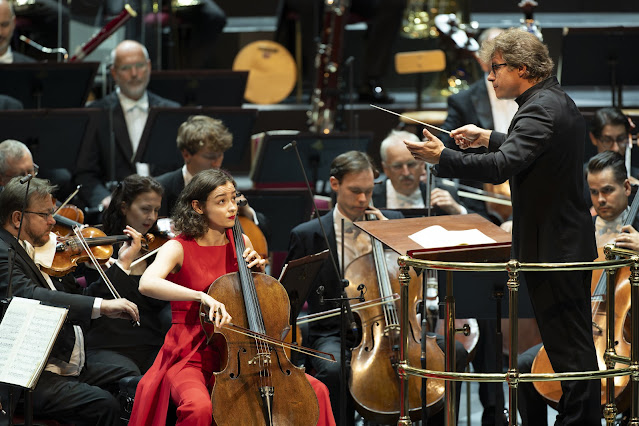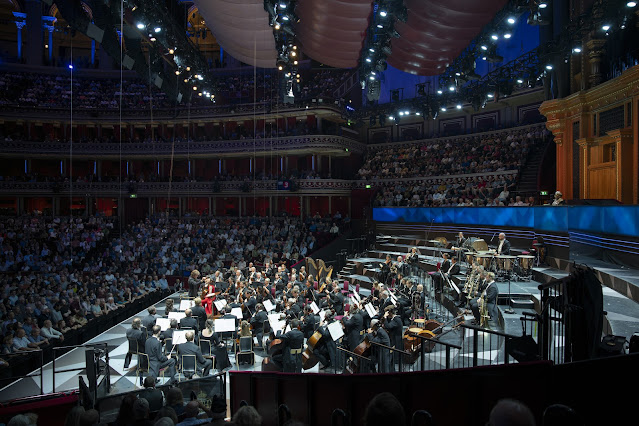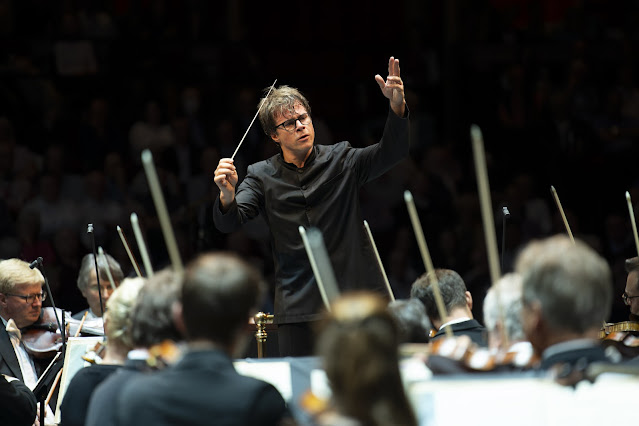 |
| Dvorák: Cello Concerto – Anastasia Kobekina, Czech Philharmonic Orchestra, Jakub Hruša – BBC Proms (Photo: BBC/Andy Paradise ) |
Dvořák: Cello Concerto, Suk: Asrael Symphony; Anastasia Kobekina, Czech Philharmonic Orchestra; Jakub Hrůša; BBC Proms at the Royal Albert Hall
Reviewed 27 August 2024
The Czech orchestra impresses with its superb accompaniment to Kobekina’s idiomatic approach to the concerto, and then Suk’s huge symphony receives a superb performance, completely consumate and deeply felt
The Czech Philharmonic Orchestra and its principal guest conductor, Jakub Hrůša, have been on a tour of European Summer festivals with stops at Elbphilharmonie Sommer in Hamburg, the Lucerne Festival and Wiesbaden’s Rheingau Musik Festival with a final stop at the BBC Proms with two concerts. For their first concert, on Tuedsay 27 August 2024 at the Royal Albert Hall, Jakub Hrůša conducted the Czech Philharmonic Orchestra in Dvořák’s Cello Concerto, with soloist Anastasia Kobekina, and Josef Suk’s Asrael Symphony.
Suk’s masterwork was making only its second appearance at the BBC Proms. Czech Philharmonic and Hrůša have recorded Asrael for a Suk cycle they are currently preparing for Pentatone, whilst Hrůša conducted the Bamberg Symphony Orchestra (of which he is chief conductor) in Suk’s Asrael Symphony at the Edinburgh International Festival earlier this month.
 |
| Dvorák: Cello Concerto – Anastasia Kobekina, Czech Philharmonic Orchestra, Jakub Hruša – BBC Proms (Photo: BBC/Andy Paradise ) |
Dvořák’s Cello Concerto was written for his friend cellist Hanuš Wihan in 1894 whilst Dvořák was working in New York at the National Conservatory for Music, and one of the more unlikely impetuses for the work is that whilst in New York, Dvořák heard the premiere Cello Concerto No. 2 by composer and cellist Victor Herbert, one of the teachers at the conservatory. Herbert’s use of a cello in a concerto was unusual at the time but the writing convinced Dvořák. Another inspiration is that whilst writing it, he learned that his sister-in-law was dying and she was the woman that Dvořák had originally been in love with!
Hrůša and the orchestra began the work in an almost understated way, yet with excitement in the rhythm, then Kobekina entered, giving us a rich, very focused sense of line. Throughout the work her tone combined passion and elegance with focus. In the first movement, her approach was fluid and flexible yet always adding a precision to the phrasing. Her playing went from decisive and passionate to intimate and tender, often up front and remarkably fierce. Hrůša and the orchestra followed and supported her superbly, and there was a lovely strong presence to the wind playing. This came out at the opening of the second movement, where the wind ensemble was full of character. Kobekina moved from tender and elegant to intense. She played the cadenza-like section with great freedom, with some lovely wind solos, but there was also the suspicion that she rather tended to dwell too long on details, to stop too often to smell the daisies, at the expense of the work’s overal lyrical impetus. The opening of the finale was perky, almost a march with Kobekina’s playing insouciant. Elegance and passion featured here again, with cello playing of great freedom. The work’s ending, with its quieter slow sections, felt a little too stretched out, as if Hrůša was letting Kobekina be a little too self indulgent in the freedoms she took with the slowing things down. Overall, I found the approach a bit too artful, and wished the artists had allowed the concerto to flow a little more. But you cannot but admire the superb accompaniment that Hrůša and the orchestra provided, following Kobekina at every turn.
Kobekina’s father is the Russian composer Vladmir Kobekin and as an encore she played a delightful work by her father, Galliarda Variations on an Ancient Theme, for cello and tambourine!
Josef Suk wrote his Asrael Symphony after the death of his beloved wife, Otilie, and his father-in-law, Dvořák. The work is large scale, rather Straussian in its use of the orchestra, and Suk bases the music on developing small motifs with an approach to structure that eschews traditional forms. In five movements, the music is a voyage around grief, yet is never static, you sense Suk constantly moving and seeking, before ultimately, after an hour or so, finding resolution.
The first movement can be seen as a struggle between life and death, with Asrael being the angel of death. The opening was sober, low and solemn, with Suk’s writing being quite spare, using instruments in groups and building layers gradually until the full orchestra entered. The movement felt like a slow working out of deeply felt passion, and Suk’s use of a series of motifs seemed to only gradually coalesce into a greater whole, before the opening material returned. Following without a break, the slow movement explored loss, the material fleet and phantasmagorical at first, but then strong and menacing, with Hrůša bringing a wonderful sense of detail to the work’s complex writing. After an intense climax, the opening material returned, spare, dark, intriguing and full of tension. The result was quite remarkable. The fleetly evanescent third movement also followed without a break, this was restless with a real edge to the playing whether quiet or strong. The way Suk made episodes flow into each other gave it a somewhat filmic feel, avant la lettre, a restlessness that never settled. The final dance section was menacing and tense, a definite angry edge to the music.
The fourth movement, which opens Part Two of the symphony, creates a portrait of Suk’s wife by recalling and remembering themes, material and motifs. The opening of the first movement is recalled in a more menaching way, yet an intense orchestra tutti metamorphoses into something almost tender and sweet. Yet the sense of phantasmagoria was present too, and after a recall of the opening, the work ended with a sense of real power.
The final movement began in uncompromising style, restless and vivid, there were moments which seemed pre-echoes of Shostakovich. A moment for eerie muted trombones led to more vicious elements, tension built and a fugato whipped up into something strong and deeply felt, but Suk manages to transform this and the ending was completely magical with Hrůša drawing out superbly detailed and intimate playing from his large orchestra.
 |
| Josef Suk: Asrael Symphony – Czech Philharmonic Orchestra, Jakub Hruša – BBC Proms (Photo: BBC/Andy Paradise ) |
By the end we understood the terrific distance that Suk and the music, and we the audience, have travelled. This was a superb performance, completely consumate; Hrůša and his orchestra brought a naturalness and a finely lived in quality to this music. Suk’s distinctive approach to structure never felt idiosyncratic, Hrůša made it feel obvious and the commitment of his players was palpable.
The whole concert is available on BBC Sounds until 30 days after the end of the BBC Proms.
The blog is free, but I’d be delighted if you were to show your appreciation by buying me a coffee.
Elsewhere on this blog
- Far from special interest: discs of brass band music by Arthur Bliss and Malcolm Arnold, two brilliant and highly satisfying portraits – record review
- Into the unknown: soprano Aoife Miskelly makes her debut with Vache Baroque in Pergolesi’s rarely performed opera, L’Olimpiade – interview
- Responses to Thomas Hardy: composer
Arthur Keegan’s complex web of music new and old, atmospherically
performed by Lotte Betts-Dean, James Girling & Ligeti Quartet – record review - Prom 40: Transcending limitations, Bach’s St John Passion from Masaaki Suzuki and Bach Collegium Japan – concert review
- Prom 37: intense contrasts thundering cannonades to personal intimacy, Antonio Pappano conducts Britten’s War Requiem – concert review
- Music is the best argument for its continued existence: John Largess of one of the USA’s most celebrated quartets, the Miró Quartet – interview
- More Buffy the Vampire Slayer than German Romanticism: Gothic Opera’s Der Vampyr at the Grimeborn Festival – opera review
- Substantial and satisfying listening: Stuart Hancock’s score for the new film, Kensuke’s Kingdom – record review
- White-hot dramatic impetus: Meyerbeer’s Le prophète on LSO Live uses a traditional version but captures the work’s essential drama – record review
- Songs from two golden ages: Nicholas Mulroy, Elizabeth Kenny & Toby Carr in a recital of effortless beauty – record review
- Everything is connected: Barbican Quartet on their debut album, Manifesto on Love, on Genuin label – interview
- Vivacity, humour & pathos: Opera Holland Park & Charles Court Opera in Gilbert & Sullivan’s The Yeomen of the Guard – opera review
- Home







%20Craig%20Fuller.jpg?w=160&resize=160,160&ssl=1)
